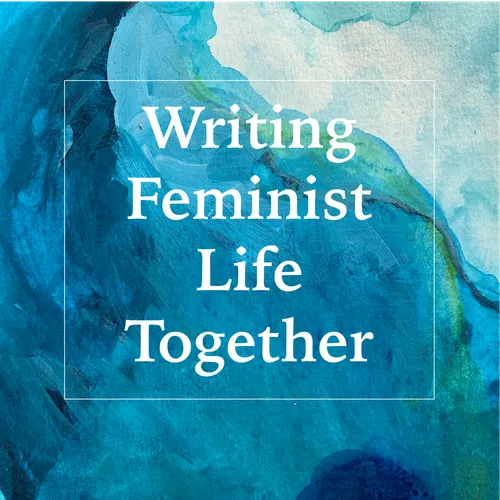
Writing Feminist Life Together
Writing Feminist Life Together is a collection of 30 feminist teachings that remind us that feminism gives us the invitation to slow down, connect with our body, and nourish our imagination. We combine feminist and ethnic studies research, contemplative writing, and other mindfulness practices, in order to connect our inner life to a world needing healing (r)evolutions. Grab a writing journal and join your host, Dr. Kimberly B. George. See her online courses on feminism, education, and contemplative practice at www.FeminismSchool.com.
- Update frequency
- every 6 days
- Average duration
- 24 minutes
- Episodes
- 30
- Years Active
- 2018 - 2019

A Psychosocial Theory of Recognition
This episode offers my PhD research at the intersections of neuroscience, therapy, and feminist writing practices to talk about what the processes of recognition—and non recognition—do to us. I espec…

On Recognition & Growth
Neuroscience tells us recognition is important for how our brains grow. What parts of yourself do you need to name and recognize? What parts of yourself would you like to ask others to recognize? How…

Holding the Knowledge Within Grief Labor
How can feminist writing practices help us get closer to the knowledge inside ourself that is both powerful and entwined within deep grief labor? And how do we learn to hold that process as it unfold…

Deprivation, Resilience, Community: Reframing Self Care
Self-care is useful as a coping mechanism, but it's also an attempt at an individual solution to a problem that has deep, systemic roots. i talk about identifying our needs and deprivations, as well …

Fearing Change, Money, and Feminism
One of the reasons people fear change in the feminist journey is because challenging patriarchy usually is not profitable! I talk in this episode about what it means to build alternative community st…

What Change Do We Fear in the Feminist Healing Journey?
Often, we unconsciously block our next steps of healing because we fear the ripple effects of our changing. But the feminist journey is about change—so it is important to be able to consider and name…

Trauma Studies, Healing, Holding Space
This podcast engages across trauma studies to consider Gloria Anzaldua's writing on healing: "You don't heal the wound. The wound heals you." I also discuss mind-body connection and the deep anxiety …

Power, Projection, Patriarchy
This episode furthers the discussion in my July 16 blog post (see kimberlybgeorge.com) that identifies a specific and very common interpersonal power dynamic of patriarchy connected to projection and…

Feminism as Memory Work
What comes into view when we think about feminism as fundamentally a practice of memory work, and one that facilitates healing through re-membering and integrations of all kinds? And what if the next…

Grief, Creativity, Spirit/Spirituality
How we hold our grief and allow our grief to connect us to greater transformation is a very difficult part of the feminist journey. I discuss why I believe grief needs a creative process that can hel…

Men Learning Feminism (a Series): Part III
Educator A.J. Hostak and I discuss his feminist journey as it relates to masculinity, vulnerability, and building coalitions. We talk about how the 10 year gap in our ages is relevant for the cultura…

Men Learning Feminism (a Series): Part II
I interviewed educator and teaching artist Joshua Lewis about his journey of engaging feminist learning as a white cis man. We talk about tears, hierarchies of masculinity, and the theft of the self …

Men Learning Feminism (a Series): Part I
I dialogue with one of my clients about his journey as a white man learning to engage in feminist reflection and labor. We talk about vulnerability, why the work is hard, and how it is that feminism …

Christian Theocracy, Patriarchy, & Honoring Our Grief
I had an important conversation with Stephanie Drury, trauma specialist and the brilliant host of the forum Stuff Christian Culture Likes. Listen to us talk about abortion, cis men's defense mechanis…

Trauma Studies: Part II
Part of traumatic experience, as connected to structural violence, is the ways in which our knowledge of the world is gaslight, denied, and minimized. How do we reclaim that knowledge? How does mind-…

Trauma Studies: Part I
In the beginning of this series on trauma, we will ask questions like: What is the relationship between patriarchy and refusing our own felt experience of vulnerability? How does patriarchy interrupt…

Part 2: Defense Mechanisms, Difficult Knowledge, & Heterosexual Relationships
What happens when defense mechanisms are protecting power and privilege? What are ways through this impasse in our relationships? And why is connecting with our body so important as we move through i…

Part I: Defense Mechanism, Difficult Knowledge, & Heterosexual Relationships
Part 1 in a series explaining how enacting defense mechanisms are part of learning what feminist psychoanalyst Deborah Britzman calls "difficult knowledge." This episode hones in on the defense mecha…

Resisting Scripts & a Theory of the Unconscious
What moment in your life, perhaps your childhood, best reminds you of your innate capacity to resist social scripts of conformity that never made sense to you? Why are adults sleeping as global warmi…

What is your image of spiritual awakening?
How would you describe how spiritual awakening connects to 1) our own capacity to do our true work in the world and 2) our own capacity to help others do their true work in the world? This episode is…